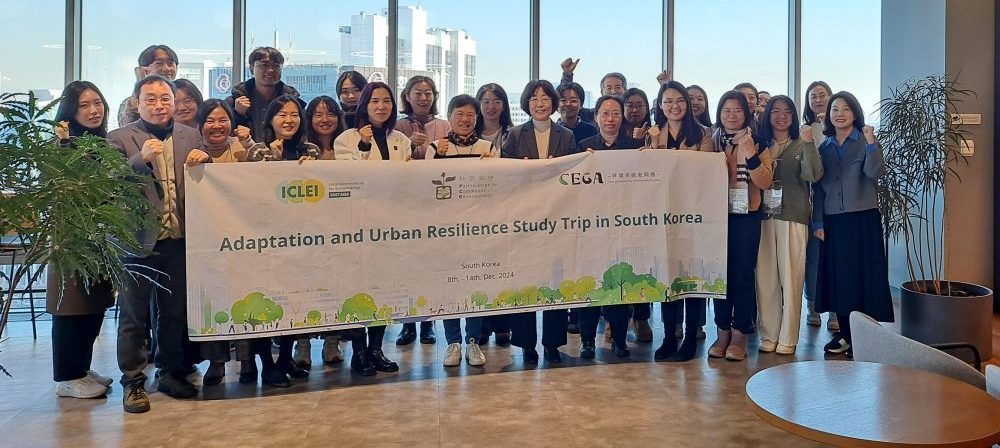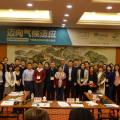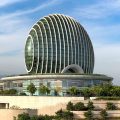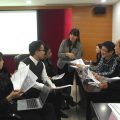Strengthening Urban Resilience through Korea-China Cooperation: Successful Conclusion of the 2024 Climate Adaptation study trip Program

ICLEI East Asia Secretariat, in collaboration with the Partnerships for Community Development (PCD) and the China Environmental Grantmakers Alliance (CEGA), successfully hosted a study trip program “Adaptation and Urban Resilience Study Trip in South Korea” from December 8 to 14, 2024, aimed at enhancing urban climate adaptation and resilience strategies between Korea and China. The program welcomed a delegation of 15 representatives from the Chinese Ministry of Ecology and Environment and various civil society organizations.
Over the course of seven days, participants visited key cities in Korea, including Seoul, Incheon, and Suwon, to explore various strategies for climate change adaptation and urban resilience. The delegation engaged with 21 institutions and visited 20 key sites, fostering discussions on sustainable urban development and community engagement.
Program Highlights
December 8 (Seoul)
Arrival from China to Seoul

December 9 (Seoul): Citizen engagement, renewable energy, local action on sustainable development, and urban resilience
Participants visited Seongdaegol Energy Independent Village to explore community-driven energy production and consumption models. They then attended discussions at the ICLEI East Asia Secretariat on sustainable development policies. Later, they visited Seoul City Hall to gain insights into the city’s disaster management and climate change response strategies.

At Seongdaegol Energy Village

At ICLEI East Asia Secretariat

Disaster & Safety policy presentation at Seoul City Hall
December 10 (Seoul): Governance and partnership, citizen engagement, climate change mitigation, and urban farming
At the Seoul City Hall Climate and Environment Policy Division, the delegation learned about the operations of the Citizen’s Committee for Green Seoul and case studies of local government-citizen collaboration. They then visited the rooftop of the Gongneung Youth Center for Culture and Information to examine solar panel installations and moss-covered green roofs, highlighting citizen engagement in climate action. The group also toured Cheonsu Community Garden in Nowon-gu District to observe urban agriculture and green space initiatives aimed at mitigating climate change.

Presentation on the Citizen’s Committee for Green Seoul at Seoul City Hall

At the rooftop of the Gongneung Youth Center for Culture and Information

At the Cheonsu Community Garden
December 11 (Incheon): Urban resilience, and climate change adaptation
Representatives from UNDRR ONEA-GETI, the Ministry of the Interior and Safety (MOIS) of Korea, and the Incheon Metropolitan Government joined discussions on enhancing urban resilience at international, national, and local levels. The delegation visited the Free Economic Zone Observatory, the Incheon Smart City Operations Center, the waterfront area, and a waste incineration plant to explore the role of smart technologies and urban infrastructure in sustainability and climate adaptation. Additionally, they toured the Incheon Environmental Corporation to learn about wastewater treatment and climate adaptation measures.

Learning urban resilience from UNDRR, MOIS, and Incheon at UNDRR ONEA-GETI

At Incheon Free Economic Zone Observatory

At Incheon Smart City Operations Center

Group photo after the presentation on Incheon Environment Cooperation sewage system
December 12 (Suwon): Governance, citizen engagement, ecomobility, and climate change education
At Suwon City Hall, participants were introduced to the Suwon’s citizen-led process for establishing and implementing the Sustainable Development Goals (Suwon-SDGs). They visited the Gwanggyo Water Circulation Center to observe rain water purification and recycling systems. Additionally, they examined sustainable mobility policies and citizen participation efforts following the 2013 EcoMobility Festival. Discussions on citizen education programs for climate action were held at Suwon Climate Change Education Center – Dodream.

Presentation on Suwon SDGs at Suwon City Hall

At Ganggyo Water Circulation Center

At Haenggung-dong EcoMobility Village

At Suwon Climate Change Education Center
December 13 (Seoul): Urban farming, circular development, water management, young citizen engagement on climate change action
The delegation visited urban farms and smart farms in Mapo District to review Seoul’s urban agriculture policies and practices. They explored Almang Market, a zero-waste shop promoting sustainable consumption culture. At the Jungnang Water Recycle Center, they examined Seoul’s wastewater treatment system. Later, they engaged with BigWave, a youth organization leading climate action initiatives.

At Mapo-gu District Office

At Almang Market

At Jungnang Water Recycle Center

Presentation on BigWave
December 14 (Seoul): Nature-based solution and closing
The group took a walking tour along Cheonggyecheon Stream, studying urban redevelopment and nature-based solutions (NbS) applications. The study trip concluded at the ICLEI East Asia Secretariat, where participants shared insights and discussed future collaboration opportunities.

At Cheonggyecheon Stream

Participants with participation certificates
Program Outcomes and Future Directions
Participants expressed a high level of satisfaction with the depth and breadth of the program. They gained a systematic understanding of Korea’s multi-layered approach to urban climate resilience. Drawing on lessons learned during the study trip, they plan to promote community collaboration and design climate adaptation initiatives within China. Experts and local stakeholders emphasized the importance of government, private sector, and citizen cooperation in addressing climate challenges.
ICLEI East Asia played a crucial role in facilitating knowledge exchange and in-depth discussions throughout the program. Looking ahead, the participants plan to conduct more in-depth research in 2025, focusing on innovative approaches to climate change mitigation and adaptation strategies.
This study trip program was made possible through the leadership of ICLEI East Asia, PCD, and CEGA, as well as the active support and collaboration of local governments and civil society organizations. As Korea and China face shared challenges in responding to climate change, this program serves as a foundation for deeper cooperation in the years to come.
In 2025, the program will evolve further, fostering more concrete policy exchanges and practical collaborations to advance climate resilience and sustainability efforts in both nations.
Related article:
- ICLEI article
- CEGA’s posting on WeChat (in Chinese)
- Project Report




